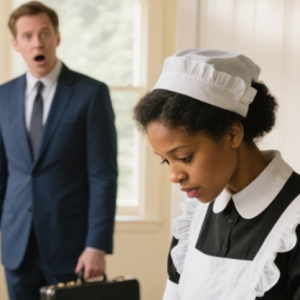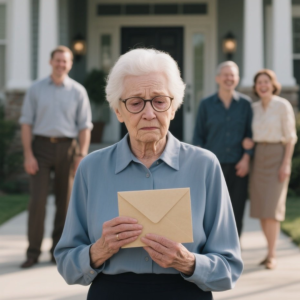
The air wavered with heat as I turned into the long driveway of the Harris residence. My dashboard read 104°F — the kind of heat that could melt asphalt.
I hadn’t told my daughter, Claire, that I was coming. She’d been married just six months, and lately her calls were short, hesitant — as if someone might be listening.
The house looked peaceful, framed by perfect hedges and the quiet rhythm of sprinklers. I waited, expecting her to run out like she used to. No one came.
Then I heard a faint sound — glass clinking somewhere behind the house. I followed it and froze.
Claire stood beside a garden shed, wiping sweat from her forehead, her clothes damp with heat. The shed was barely big enough for tools, yet inside sat a thin mattress, a dying fan, and a half-empty jug of water.
“Claire?” My voice cracked.
She spun around, startled. “Mom! You shouldn’t be here,” she whispered, eyes darting toward the house. “Please — go before they see you.”
“Who?” I demanded, stepping closer.
“Mom, they don’t allow outsiders inside the house,” she murmured. “It’s… tradition. I just have to stay here until they trust me.”
“Trust you? You’re their daughter-in-law, not a servant!”
Tears welled in her eyes. “Please, Mom. If they find you here—”
But I couldn’t walk away. I opened the shed door wider, saw the stifling air, the bare floor, the heat pressing in. Something inside me snapped.
Ten minutes later, her suitcase was in my hand, and I was leading her toward the car. As we pulled out, the front door opened. Her in-laws, Mr. and Mrs. Harris, stood on the porch, staring in disbelief as we drove away.
For twenty miles, we didn’t speak. When I finally stopped at a gas station, I turned to her. “Tell me everything.”

It came out slowly, in broken whispers. After the wedding, the Harrises — wealthy, proud of their family name — had insisted she and her husband Ethan live with them “until they saved for a house.”
But soon came the rules: no visitors, no going out without permission, silence when the elders rested.
Once, when she objected, Ethan’s mother told her, “In this family, obedience is love.”
When Claire caught a mild cold, they forced her into the shed “to protect everyone’s health.” Days turned into weeks, then months. Ethan rarely visited. “They said it was for harmony,” she murmured.
I clenched the steering wheel. “That’s not harmony. That’s cruelty.”
Back home, I gave her a shower, food, and a clean bed. That night, I couldn’t sleep, haunted by the image of her wilting in that shed.
The next morning, Ethan called.
“You had no right to take my wife,” he said.
“I had every right,” I answered coldly. “You left her outside in that heat.”
“You don’t understand our customs,” he muttered.
“Customs don’t justify abuse,” I snapped, and hung up.
Two days later, the Harrises appeared at my door — calm, composed, pretending righteousness.
“Mrs. Brooks,” Mr. Harris began, “you’ve interfered with our family order.”
“By locking her in a shed?” I shot back.
His wife’s smile was thin. “Claire agreed to our ways. She needed to learn humility.”
Claire stepped out from the hallway then, her voice steady. “No. I was scared to refuse.”
Silence fell. I picked up the phone. “If you don’t leave, I’ll call the police.”
Mr. Harris’s jaw tightened. “That won’t be necessary.” They turned and left, their masks finally slipping.
After the door shut, Claire broke down. “I thought it was my fault,” she whispered. “They said I was ungrateful.”
“You’re not,” I said, holding her. “You were surviving.”
Weeks passed. Therapy helped. She found work at a small library, started smiling again, and filed for separation. The police soon paid the Harrises a visit — turns out she wasn’t the first daughter-in-law they’d treated that way. But she was the first to escape.
Months later, when summer returned, I found her tending a small flower bed in my yard. She looked up and smiled softly. “Mom… it feels strange being free.”
I hugged her tightly. “That’s what healing feels like.”
The heat shimmered again around us — but this time, it wasn’t cruel. It was just summer.
And my daughter was finally home.




